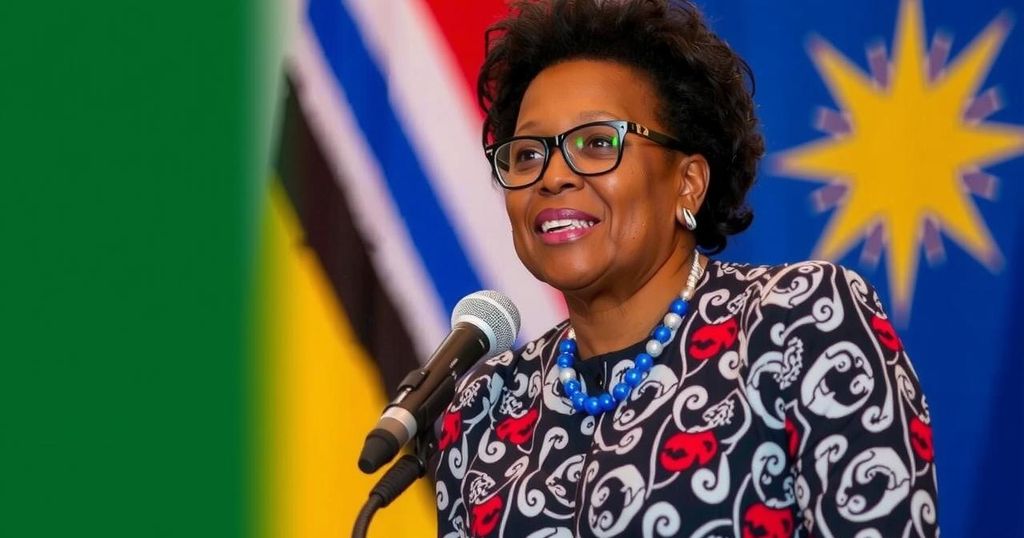Namibia’s Vice President Leads in Controversial Presidential Election
In the presidential election in Namibia, Vice President Netumbo Nandi-Ndaitwah is leading despite significant technical problems that marred the process, prompting opposition claims of illegality. Early results suggest she has around 56% of the votes counted. The opposition plans to challenge the election, raising concerns about its legitimacy amidst growing public frustration over economic issues and corruption within the ruling party, SWAPO.
Namibia’s Vice President Netumbo Nandi-Ndaitwah is currently leading in the early results of the country’s presidential election, despite facing significant challenges during the voting process. Technical issues, including a shortage of ballot papers, led to an extension of voting for three additional days, which has been contested by the opposition. With partial results showing Nandi-Ndaitwah with approximately 56% of the votes counted, the credibility of the election remains in question as opposition parties prepare to challenge the outcomes in court, citing concerns over the legality of the vote extension and asserting that the electoral process has been compromised.
The election, held on November 27, 2024, has seen widespread participation from Namibians, with over 1.4 million votes cast across the nation. Nandi-Ndaitwah’s ascent has potential historical significance as she aims to become Namibia’s first female president. However, her ruling party, the South West Africa People’s Organization (SWAPO), is currently grappling with public dissatisfaction concerning high unemployment rates and unresolved economic issues, especially affecting the youth. This dissatisfaction has led to corruption scandals that have dimmed the party’s initial liberating image among the populace.
In the backdrop of socioeconomic struggles, the Independent Patriots for Change party is mounting a legal challenge against the election. This latest round of voting comes amid a broader trend of declining support for long-standing ruling parties in southern Africa, prompting citizens to demand transparent governance and accountability. Opposition leader McHenry Venaani emphasized that “it is about our democratic credentials, it’s about the country that must work for everybody, the poor and the rich.”
While Nandi-Ndaitwah presents an opportunity for a milestone in Namibian history, her party’s standing is jeopardized by ongoing frustrations from the electorate, reflected in the broader context of changing political landscapes within the region. The Electoral Commission of Namibia stated there will not be a rerun despite the challenges articulated by the opposition, leading to an uncertain political future as the nation awaits final results and potential court deliberations.
Namibia has a relatively stable electoral history and is praised for its democratic processes. However, recent elections have been overshadowed by significant complaints from opposition parties regarding technical problems during the voting process. These issues included shortages of necessary materials, resulting in extended voting times and claims of illegality. The ruling party, SWAPO, has been in power since Namibia’s independence in 1990, yet increasing public frustration over economic challenges has created a more contentious political atmosphere. The election in question not only serves as a critical barometer for SWAPO’s popularity but also reflects broader regional trends within southern Africa, where long-standing ruling parties are facing heightened pressure to evolve or risk losing their grip on power.
The early results of Namibia’s presidential election indicate a lead for Vice President Netumbo Nandi-Ndaitwah, yet significant issues during the electoral process cast a shadow over the legitimacy of these outcomes. The extension of voting days due to technical problems has prompted opposition parties to prepare legal challenges against the election results. As Namibia stands at a potential turning point, both politically and economically, the unfolding situation could lead to crucial reforms in its electoral process and governance, impacting its democratic credentials.
Original Source: apnews.com




Post Comment